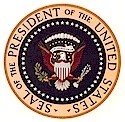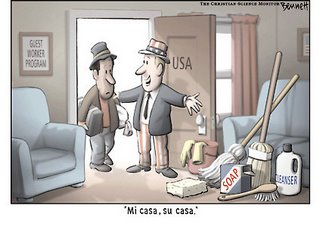Lesson One: Do Not Make War Against Abstract NounsI find, in my personal experience, that when conservatives and liberals are in agreement on a topic, the truth of that topic is difficult to deny. As America finds itself quagmired by the so-called War on Terror, Liberals and Conservatives are
agreeing more, each day that our troops are in Iraq, with the notion that this War on Terror is an ineffective way to destroy and neutralize our enemies. There is a new
book on the shelves which supports the position that the
War on Terror is an insufficinet, phony attempt at peace and that the Bush Administration is wasting our precious resources by declaring war on an abstract noun - Terrorism.
The author, Angelo M. Codevilla, is not a left wing pundant nor a liberal elitist academic. He's the chief editor of the American Spectator, Professor of International Relation at Boston University, and a true conservative by his own admission.
In his new book
No Victory No Peace, Angelo M. Codevilla makes a compelling argument that George Bush does not embody conservatism in any traditional sense. He also illustrates that if George Bush's Foreign Policy and Defense Policy is correct than all of the lessons that every professor of International Relations have been teaching for the last several hundred years is nonsense; which is possible, but is it likely?
For example the notion of war -- war is a violence aimed at killing or destroying a specific person or institution that stands in the way of something you want, whether it is peace, oil, land, etc. In war, the enemy must be known. You cannot win or wage a war against an abstract noun or concept. In order to win, you must have a defined enemy.
Angelo M. Codevilla also maintains that a nation should not make wars while neglecting the fact that the people who insight violence against you are receiving billions of your dollars - yet do nothing to cut them off.
Most important though, he makes a clear argument that you do not make war to attempt to change another people’s society. These criteria cannot be a means of a successful war.
You don't have to take my word for it, below is an essay by Angelo M. Codevilla on the topic of Iraq and the Bush Administration. You can read more of this works
here.
His book,
No Victory No Pease in available on Amazon.
Postmortem on a Phony Warby Angelo M. Codevilla
"
For them, war would consist of fighting as little as possible."—Charles de Gaulle, on Franco-British policy between September 1939 and June 1940.
[1]By spring 2002, the Bush administration's pretense that it was making war had worn thin. The Bush team had declared that September 11 had "changed everything," that "those who are not with us are against us," and that its "war on terrorism" would dispense with latter-day American reticence about foreign engagements and warfare. Nevertheless, the Bush team fought a classic phony war, because its chief priority was to change as little as possible the visions, objectives, assumptions, and modus operandi of late-twentieth-century American elites. This calls for something of a postmortem on the "war" that never was.
The Bush team's chief objective, "stability," was the least possible of things. The vision of an orderly, multicultural, "international community" was as powerful in Bush's Washington as it had been in Woodrow Wilson's—and as far removed from reality. The right of Third World regimes to sovereign existence under housebroken tyrants, America's right and capacity to make peace in places it does not rule, America's unworthiness to stigmatize foreign cultures (much less to kill foreign regimes), the U.S. government's need to heed "the allies," especially "the Europeans," and to restrain the "unsophisticated," "unilateralist" American public—these and a host of other unserious assumptions continued to reign. Moreover, the Bush team employed the same kind of people and modus operandi as its predecessors. They spoke loudly and wasted America's stick on the least significant enemies.
After Arabs had terrorized America on behalf of Arab causes, the Bush team refused to fight or even to indict any Arab entity at all. It did this to shore up "friendly" Arab governments that (it chose not to notice) were in thrall to the terror states of Iraq, Syria, and the Palestinian Authority (PA). By mid 2002, the Bush team's war on terrorism consisted chiefly of impotent, counterproductive, and silly security measures at home and, in the Middle East, of restraining Israel.
Rather than forcing others to accept America's version of peace, the Bush policy conveyed readiness to accept others' ever-pricier promises of peace. That is what "peace processes" are about: one side vainly seeks to avoid the reality of war. Bloody, phony peace is the natural fruit of phony war. That is because once the killing starts, one side's reticence is the greatest encouragement for the other to fight. And the longer wars go on, the more possibilities they offer to the bold. Thus any government that stints pursuit of victory to preserve its favorite current arrangements inevitably finds others imposing their own agendas.
(Bad) Ideas Have (Worse) Consequences
The Bush team decided to make war on "terrorism" (an abstract noun), rather than on real people. Rather than destroy regimes whose demise might make the American people safe from terrorist attacks, the Bush team pursued only the "shadowy" al-Qa‘ida, as if a private organization could organize worldwide mayhem from Arab police states without being one of their tools. Why this James Bond-ish fiction? Because the Bush team did not deem the events of September 11 sufficient warrant for going against the predominant views of American elites (which it shares) about real people.
Through most of the twentieth century, American elites have willed to believe that all peoples are created equal and that, if all were ruled by their own kind, a stable, decent, peaceful world would result. Hence in the 1950s in the Middle East as elsewhere, the U.S. State Department and especially Central Intelligence (CIA) fostered nationalism, socialist parties, and the replacement of European colonial rule by native regimes. When speaking to CIA director Allen Dulles, his brother John Foster Dulles, the secretary of state, would refer to Egypt's Gamal Nasser as "your colonel."
[2] As early as 1958, however, the political ancestors of Saddam Husayn had taken over Iraq and Syria as well as Egypt. Yemen became a Soviet ally. Much of the region (like the rest of the Third World) would be neither peaceful nor decent—much less, pro-American.
America's "best and brightest" tried to maintain their conviction that somehow local rulers would safeguard America's interests in the region: oil, a modicum of peace, as well as safety for Israel. American elites would not use force, would not take responsibility, would continue to believe in their vision of a world of equal, sovereign peoples, and would get their way. They wanted much for little and failed to proportion the ends they sought to the means they were willing to use. Hence U.S. policy has been based on patently false pretenses: that allies in the region would play their assigned roles and that indirect U.S. force would be enough.
So, between 1958 and 1978, U.S. policymakers made Iran's shah the Westernizing paladin of Western interests. But they did not protect the shah from the anti-Western forces to which they had exposed him. After the shah's fall, they imagined that Iraq's Saddam Husayn might be got to play his role—and in addition to contain Iran. They could not believe that Saddam would pursue his own vision of empire. When, in 1990, Saddam surprised them by invading Kuwait and holding hostage the entire region, the U.S. government killed thousands of Iraqis who were irrelevant to the regime. But the reigning ideas in Washington did not allow for destroying Saddam's regime any more than they had allowed the destruction of America's real enemies in Korea and Vietnam. Thus the United States committed the only unpardonable sin in the region: weakness.
Unwilling either to abandon the region to America's enemies or simply to destroy such enemies when they arose, above all unwilling to impose their own order, the State Department officials, policy analysts, successive administrations, and polite opinion formed a consensus that designated the Saudi monarchy as the new representative of Western interests.
They then mistakenly deferred to the Saudis' judgment of their own and Western interests. Knowing all too well the Saudis' internal fragility and external weakness, they built up U.S. military forces in the region. But—and this is the key point—they had no idea of how those forces might save the Saudi regime from internal challenges. When Saudi Arabia became less hospitable, the weight of U.S. policy shifted to the Gulf sheikhdoms. But U.S. forces could no more protect any Gulf potentate than they protected the shah or Egypt's Anwar Sadat (whom his murderers called Shah-dat.) Nor would those forces kill any of the region's regimes. That is one reason why the presence of U.S. military forces since 1990 (despite or perhaps because of their kindness to the local population) has engendered contempt for America.
Another policy is of the same kind. Since the 1970s, through any number of shuttle missions and plans named for officials or conference sites (Rogers, Kissinger, Camp David, Schultz, Baker, Oslo, Ross, Wye, Mitchell, Tenet, etc.), the U.S. government has chosen to promote various forms of a deal to settle the Arab-Israeli conflict: Israel would give more power to the Palestine Liberation Organization (PLO) in exchange for the latter's promises of peaceful coexistence.
Note, however, that the United States has limited itself to outlining the deal and to pressures to enter it. President Clinton in 1993, and President Bush in 2002, declared support for a Palestinian state but left the details to be settled later. More important, none ever promised that the United States would enforce any deal. U.S. statesmen have eschewed matching military means to political ends. This insolvent, irresolute U.S. foreign policy has invited those Arabs inclined to do so to exert murderous pressure on the United States as well as on Israel. It does not take the proverbial rocket scientist to notice that increased Arab diplomatic pressure and an increased level of terrorist activity against the United States by Arabs have gone hand-in-hand with increased U.S. pressure on Israel.
The list of terrorist acts by Arabs against Americans aimed at influencing U.S. policy toward Israel is too long and well known to rehash. The list of U.S. military retaliations against an Arab government, however, contains only one small item: President Reagan's 1986 strike on some Libyan army barracks. That Arab governments allied with the United States, never mind the Arab terror regimes of Iraq, Syria, and the PA, support anti-American causes politically and psychologically is obvious to anyone who goes on-line. Equally obvious is that the American foreign policy class nevertheless continues to pretend that Arab regimes in general and even "progressive" organizations such as the PLO and the Ba‘th party are viable partners for peace. Thus U.S. foreign policy supports regimes that support anti-Americanism, even to the point of acting to retain the Iraqi regime while impotently wishing that Saddam himself would go. Yet according to the reigning mentality, the notion that terrorism is the Arab world's principal means of action is racism. Indeed, the U.S. government's official pre-September-11 attitude toward these regimes was, "One man's terrorist is another man's freedom fighter." Cultural relativism shielded from reality what the U.S. government wanted to believe about Arab regimes.
After the surprise of September 11, President Bush's public speeches sounded a different tone: "We will make no distinction between the terrorists who committed these acts and those who harbor them,"
[3] and "There is no such thing as a good terrorist."
[4] But Bush could have uprooted visions, assumptions, and practices so deeply entrenched only if he had dismissed officials who embody both cultural relativism and a disregard for the relationship between ends and means. He did not commission a team more suited to winning a war, rather using the war to entrench the very persons, mindset, and decisions that brought on the nasty surprise. That is the hallmark of phony war.
Here, patriotic rhetoric aside, is how the Bush team really sees the "war."
Although we might prefer that some regimes—Iraq, Syria, and the PA—were other than they are, the problem is the existence of a network of private extremists. Nearly all the world's governments see terrorism as a threat to civilized life and are more or less willing to help root it out. The problem is that the Kuwait war and the Israeli-Palestinian conflict misidentified the United States as anti-Muslim and anti-Arab and inhibited modernization and secularization in the Muslim world. The cooperation of governments in the Muslim world is key to defeating terrorism. To get that cooperation, we must first ensure the survival of friendly governments. To do that, we must cool popular ire against them and America. That means that any U.S. attack on Iraq or any Israeli dismantling of the PA would call forth more terrorism than it would prevent and would endanger friendly governments. Hence, the United States must cool the Arab-Israeli conflict, even at the cost of setting up a risky Palestinian state. Once Egypt, Saudi Arabia, and Jordan, and maybe Syria and the PA, too, can afford to be friendly to the United States, then liaison between their intelligence services and ours can leave the terrorists nowhere to hide. Once we have turned the war on terrorism from a political (let alone religious one) into a criminal matter, we can win it by intelligence and police measures. The paramount problem is that the American people may run short on patience.
Phony from the Start
Who to kill is the decision that defines any war. In response to the attacks of September 11 by Arabs from "friendly" Arab countries—on behalf of causes embodied by Iraq, Syria, and the PA—the Bush team decided to do nothing against any Arab entity but rather to kill people in Afghanistan. No one argued that this would make America safe from the rising enmity of the Arab world or avenge the attacks. When pressed, the Bush team did not deny that Arab governments were abetting this enmity. But it deferred the whole matter to an undefined next phase because securing the support of friendly Arab governments was the sine qua non of everything else.
Saudi Arabia conditioned its support of the war, however, on Americans not killing any Arabs at all. Later, it conditioned its support even further. Competent people know that to ask dubious allies to support action that one has shown a willingness to defer and redefine amounts to asking for further pressure to defer, redefine, and derail. Thus, from the outset, this was a war defined in terms of what must not be done and aimed at validating a view of the world according to which the war should never have started —that is, a phony war.
Permanent factors made the temporary permanent. Deference to the Saudi and Egyptian governments had also been the reason why the first Bush administration put off action on Iraq in 1991. For the same reason, the completion of the U.S. war in Afghanistan did not usher in the next phase in which the United States would fight enemy regimes in the Arab world. Instead, U.S. troops would scour the earth for individuals connected to al-Qa‘ida. In January 2002, subsequent to intelligence reports of sophisticated terrorist nerve centers in northeast Afghan caves, U.S. troops stormed them—and found nothing of the sort. But when, in March, Jeffrey Goldberg's article in The New Yorker detailed Saddam's use of al-Qa‘ida to fight the Kurds in northern Iraq, the Bush team showed no interest and deferred consideration of invading Iraq to 2003, if then.
[5]The most impotent, counterproductive, and silly part of the war however, was "Homeland Security."
Since September 11, "security" is everywhere. Police and federal agencies have unprecedented powers. Whether mailing a package, entering a large building, or especially flying commercially, Americans are subject to strictures more reminiscent of a banana republic than of America. Yet note: had all of the new security measures been in effect on September 11, they would not have interfered with the attacks. Moreover, studies have shown that even against the most heavily defended targets, terrorist attacks succeed about 85 percent of the time. Insofar as police measures work at all, they do so by targeting specific ethnic groups while sparing the general population. However, Israel's experience confirms Machiavelli's observation that the world's most stringent security measures can do little against those who are willing to give up their lives to kill. Protecting America's vast society with police measures is nonsense.
The acme of nonsense is President Bush's proposal for reorganizing existing agencies and bureaus into a department of Homeland Security. No one would change their thinking or modus operandi. They would change only their lines of bureaucratic reporting. When companies try to avoid confronting their own inadequacies, they often reorganize.
The Bush team's approach to police measures—officially assuming that anyone is as likely to be a terrorist as anyone else—is counterproductive and silly. It trains Americans to mistrust and to check each other. This approach caused security officers at one airport to detain an elderly holder of the Congressional Medal of Honor for trying to take the medal onto an airplane, and at another airport, as part of a random check, to search former Vice President Al Gore—who got more votes for president than did George W. Bush. Grandmothers from Peoria are searched, while young Arabic-looking men are not. This randomness is less in the service of security, much less of war, than it is a ritual reaffirmation of the ideology of contemporary American elites, most recently expressed by Federal Bureau of Investigation (FBI) director Robert Mueller: "We are not looking for individuals of any particular religion or from any particular country."
[6]No surprise then, that after an Egyptian with an anti-American and anti-Israeli record gunned down a crowd of Americans and Israelis at the El Al counter of Los Angeles airport, the U.S. government's official reaction was: "There is nothing to indicate terrorism."
In practice, the FBI prefers to seek out terrorists among anti-government people at home than among anti-Americans from the Middle East. Since letters containing anthrax were mailed to Capitol Hill in October 2001, the field offices of the FBI have been busy trying to prove that they were the work of a domestic anti-government scientist (an early FBI source gratuitously added right-wing) rather than of any foreign government. But after 5,000 interviews and 1,700 subpoenas; after officially suspecting 130 individual Americans and 100 companies; after being convinced of the guilt of one American who turned out to be innocent, the U.S. government has zero evidence of domestic involvement. Yet despite evidence that a September 11 hijacker was treated for an anthrax infection, that the hijackers were trying to rent crop dusters, that the anthrax spores were fresh and coated with materials typical of professional laboratories—such as the ones in Iraq—U.S. intelligence looks for domestic dissidents rather than for foreign enemies. What war? For what purpose?
On the Enemy TrackWhen Arab friends persuaded the Bush team not to fight America's enemies in the Arab world but rather to restrain Israel from striking at its enemies (their friends), the Bush team turned from America's war to the Arabs' war.
By the turn of the century, America's Arab friends, notably the Saudi royal family, were following their fears more than their friendships. Through the 1990s, Saddam Husayn's Iraqi regime had become the leading force in the Arab world. By surviving the Kuwait war to thumb his nose at Washington and denouncing all manifestations of Arab collaboration with the United States, Saddam won the allegiance of the region's most virulent elements. By adroit propaganda, money, and murder, he and the leaders of the other terror states identified Islam with anti-Westernism and with themselves. Moderate Arabs followed or died.
To derail the Bush team from America's war to their own, the Arab terror regimes had to manufacture a war. The spring of 2002 saw a dramatic increase in the attacks by various Palestinian forces against Israel. This made Palestinians immeasurably worse off materially and subjected them to constant danger of execution as collaborators. Saddam's regime and the Saudi royal family as well supplied the money for the family endowments that effectively purchased the war's principal weapon, suicide bombers. Having helped organize the carnage, the Saudis demanded that Bush stop it by making concessions to them.
Bush, the Saudis insisted, must support the creation of a Palestinian state and interpose at least some American bodies between Israel and the Palestinians. In exchange, the Saudis would try to cool the Palestinians and continue their support of the "war" (as amended). Nevertheless, they would continue to please the terror states insofar as might be necessary to ensure their own stability. And wasn't that stability the Bush team's priority? By April 2002, Bush had agreed.
Did the Bush team know or care that all this amounted not to avenging September 11, but to pretending to fight terrorists while giving in to the demands of those who harbor and pay them? Certainly they know—just not enough to change longstanding foreign policy priorities, intellectual habits, as well as the personnel of U.S. intelligence and diplomacy.
Three Monkeys Intelligence
"See no evil, hear no evil, speak no evil," describes U.S. intelligence in the war on terrorism. As in so many other matters, U.S. intelligence searches only in the lighted corners of dark rooms and reflects the priorities of Washington more than it reflects reality.
Nearly a year after September 11, U.S. intelligence still has no idea who most of the hijackers were, where the operation was organized, by whom, or who paid for it. Our professionals concluded that, except for one Usama bin Ladin, the identity of America's enemies is a mystery. Still, they are sure that our enemies are amateurs, unconnected with professional intelligence services. Nonsense.
Start with the Saudi hijackers. The photos and names released by the U.S. government match flight manifests with visa files from U.S. consulates. But the only pictures of the hijackers from security cameras are of persons other than the ones pictured and named. Indisputably, the hijackers used stolen identities. That is a mark of a major league intelligence service. (The Saudi government prevented independent investigation of who the hijackers really were.)
The hijacking itself bore marks of professionalism: the hijackers used sophisticated chemical sprays and methods of rapid entry into the cockpits, they had mastered navigation beyond what had been taught them in their U.S. flight schools, and they had turned off the planes' transponders—which also had not been taught them in the flight schools.
Then there is the $100,000 that financed the U.S. part of the mission. Muhammad Atta, an Egyptian, got it immediately after a meeting in June 2000 in Prague with Ahmad al-Ani, an Iraqi intelligence officer who specialized in handling terrorists. The account from which the money came had been professionally scrubbed of the owner's identity. On April 9, 2001, Atta made a 72-hour trip to see Ani again. Two weeks later, the trained soldiers in the hijacking left Saudi Arabia for America.
From all this, a reasonable person—also knowing that Iraq has a facility where terrorists train to take over Boeing aircraft—might conclude that September 11 had been organized by Iraq, with connections in Saudi Arabia and Egypt.
But, the CIA only paid attention to trails that the hijack operation had chosen not to cover. On September 9, Atta wired $15,000 back to a different account. This one had a name on it—an associate of Usama bin Ladin. Usama had done it! And Atta had left his flight manual in a car he had rented in his own name. He only knew what he learned in flight school! See? An amateur operation planned in one of those fabulous Afghan caves.
Note that the CIA gets almost none of its information on terrorism from its own human sources. Much of its terrorist "humint" comes directly or indirectly from the liaison services of friendly Arab governments. The CIA accepts them because of the poverty of its own sources and because what they say pleases U.S. officials. Not surprisingly, the agency's concept of a vast network of Muslim terrorists unconnected with Arab governments comes substantially from Arab governments. Its other major source of "humint," the interrogation of prisoners, is even more flawed. U.S. intelligence officials told The New York Times they were training interrogators for prisoners at Guantanamo Bay to lie a lot, that they were happy getting lots of facts that "checked out," although many prisoners' stories turned out to be misleading.
[7] Competent people know that true facts can be even more misleading than false assertions and that the sine qua non of successful interrogation hinges on truly knowing more than the person being interviewed. This is not the case with the CIA.
This is not the place to restate the CIA's record of failure and bad faith with regard to the Iraqi opposition, or its longstanding commitment to the fortunes of the PLO-PA. Rather, all this leads one to ask what service it can render in the war on terrorism.
In May 2002, the CIA ran a covert action—in Washington. One of its official sources convinced Newsweek and The Washington Post that there was no solid evidence that Muhammad Atta had ever met with Iraqi intelligence in Prague.
[8] But the interior minister of the Czech Republic immediately reconfirmed the fact of the meeting, and the Czech envoy to the United Nations did so again a month later.
[9] The CIA had briefly supported the Bush policy of taking no military action against Iraq.
[10]In short, the CIA helps enable the Bush team's strategy.
If Wishes Were Strategy
The Bush team, at least some parts thereof, knows much and wishes well. Vice President Dick Cheney declared, "wars are not won on the defensive. We must battle the enemy wherever necessary to prevent greater stress to our country."
[11] The statements by President Bush and Secretary of Defense Donald Rumsfeld to the effect that Iraq's development of weapons of mass destruction poses an unacceptable threat to America and that somehow Saddam must go are too numerous to list. President Bush finally said that the Palestinian people deserve new leadership. But there is no evidence that the Bush team knows how to translate such wishes into strategy, much less into facts.
The facts of the war on terrorism are as outlined above: in practice, the Bush team is fighting a war to salvage the visions, assumptions, and ways of current elites, not to mention their reputations. Abroad, the "war on terrorism" is of a piece with the Gulf war, the Vietnam war, and the Korean war: America kills lots of people whose deaths do not bring victory. This makes us hated. And America leaves enemy regimes standing. This makes us contemptible. At home, the "war" consists of a fateful combination of bellicose rhetoric and impotent, silly security measures. Thus even more than previous wars, the "war on terrorism" wastes the good will of the American people—the most precious thing of all. The ends of war cannot be achieved by the means of phony war.
Success fuels hope of victory, which fuels effort. By mid-2002, the Saudi government's diplomatic overtures to Tehran and above all to Baghdad, as well as its assumption of the role as their advocate to the West, meant its recognition that it was living at its enemies' sufferance. Any number of people in the region, including members of the royal family, surely saw in this the chance of their lives. When someone seizes that chance, the House of Saud will first split and then fall. That in turn will convince more people in the region to try for power and glory. That is what real wars are made of. As stability—the Bush team's premise and objective—disappears, the Bush team will have to confront the choice that it worked so hard to shun: between paying the price of victory and that of defeat. And it will have to do it from a well-earned position of disadvantage.
Governments bend to those they fear and bite those they hold in contempt. The Bush team's conduct of the war made the Arab world less afraid of America. How could that be, given all the bombs the United States dropped on Afghanistan? Simple. The Arab world knew that Washington could drop those bombs. It wondered, would the United States drop them to alter the balance of power among us? By dropping them on Afghanistan, Washington answered, no. Their estimate of the United States's capacity to protect them from threats foreign and domestic also dropped.
America became fully contemptible when the Bush team recoiled from the Arab world's brandishing of the ultimate terror weapon, suicide bombing. Count on it: the next stage of the war will feature suicide bombings on American streets.
Angelo M. Codevilla is professor of international relations at Boston University, a former naval officer, foreign service officer, and staff member of the Senate Intelligence Committee. Among his books is Informing Statecraft: Intelligence for A New Century (1992). This commentary expands upon an essay in the Claremont Review of Books (Summer 2002).
[1] Charles de Gaulle, Memoires de guerre, Vol. I (Paris: Plon, 1954).
[2] Miles Copeland, The Game of Nations: The Amorality of Power Politics (New York: Simon & Schuster, 1970).
[3] Bush's address to the nation, Sept. 11, 2001, at http://www.whitehouse.gov/news/releases/2001/09/20010911-16.html.
[4] Bush's address to the nation, Nov. 10, 2001, at http://www.whitehouse.gov/news/releases/2001/11/20011110.html.
[5] Jeffrey Goldberg, "The Great Terror," The New Yorker, Mar. 25, 2002.
[6] FBI director Robert Mueller, answer to questions by the Senate Judiciary Committee, June 6, 2002, view at http://video.c-span.org:8080/ramgen/jdrive/ter060602_mueller.rm.
[7] The New York Times, May 15, 2002.
[8] Michael Isikoff, "The Phantom Link to Iraq," Newsweek, May 6, 2002; Walter Pincus, "No Link between Hijacker, Iraq Found, U.S. Says," The Washington Post, May 1, 2002.
[9] Stanislav Gross, Czech minister of the interior, quoted by James Pitkin, "Czechs: Hijacker Met with Iraqi Spy," Prague Post, May 8, 2002; Hynek Kmonicek quoted by Edith M. Lederer, "Czech Official Insists Meeting with Terrorists Occurred," Associated Press, June 4, 2002.
[10] William Safire, "Mr. Atta Goes to Prague," The New York Times, May 9, 2002.
[11] Cheney speech to Federalist Society, Nov. 15, 2001, at http://www.fed-soc.org/events/lawyersconvention/cheney.htm.



















